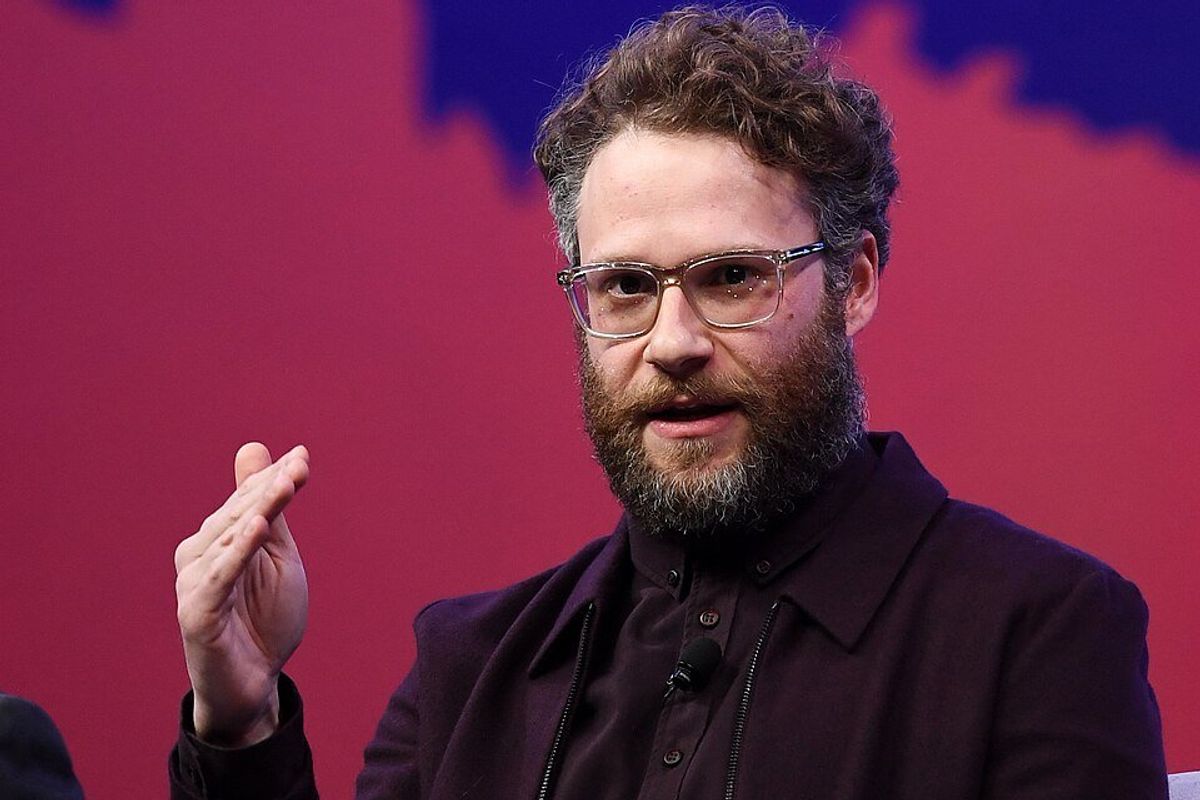Seth Rogen was asked if having kids would make him 'happier.' He answered honestly.
Men almost never get questions like this.
Seth Rogen on stage during the opening night of Collision 2019 at Enercare Center in Toronto, Canada.
Breaking news: There's a big double standard in Hollywood. Childless women in the public eye are often plagued by the question: “So, why don’t you have any children?” It’s a deeply personal question that cuts right to the bone, and there can be many answers. But, if the woman doesn’t want children and says so publicly, she is bound to face some judgment.
"[I don't] like [the pressure] that people put on me, on women—that you've failed yourself as a female because you haven't procreated. I don't think it's fair," Jennifer Aniston told Allure. "You may not have a child come out of your vagina, but that doesn't mean you aren't mothering—dogs, friends, friends' children."
On the Monday, March 6 episode of “The Diary Of A CEO” podcast, host Steven Bartlett asked actor Seth Rogen why he’s childless, and it was a rare moment where a man in the public eye was challenged on the topic. Rogen gave a thoughtful explanation for his and Lauren Miller’s decision to be child-free.
Rogen and Miller were married in 2011.

“There's a whole huge thing I'm not doing, which is raising children,” Rogen told Bartlett. The host attempted to play devil’s advocate and asked Rogen if he considered whether having children might have made him and his wife “happier.”
“I don't think it would,” Rogen responded.
Then, as if anticipating the question, the “Pineapple Express” star upended one of the arguments that people who have children often make: that people who don’t have children have no idea what it’s like.
“I've been around obviously a lot of children; I'm not ignorant to what it’s like…Everyone I know has kids. I'm 40, you know? I know,” Rogen said. “Some of my friends have had kids for decades. Some people want kids, some people don't want kids.” He added that many people seem to have kids without considering the issue.
“I mean, a lot of people have kids before they even think about it, from what I've seen, honestly,” he said. “You just are told, you go through life, you get married, you have kids—it’s what happens.” Rogen and his wife have only grown stronger in their decision and they believe that it has helped their relationship.
“Now, more than anything, the conversation is like, ‘Honestly, thank God we don’t have children,’” he continued. “We get to do whatever we want. We are in the prime of our lives. We are smarter than we've ever been, we understand ourselves more than we ever have, we have the capacity to achieve a level of work and a level of communication and care for one another, and a lifestyle we can live with one another that we've never been able to live before. And we can just do that, and we don't have to raise a child—which the world does not need right now,” Rogen concluded.

Rogen received a lot of pushback for his comments, and two years later, in an interview with Esquire, he addressed the criticism and doubled down on his decision. “People really had strong takes on it, being like, ‘F**k this f**king guy,'" he said. “Well, if you hate me that much, why do you want more of me?” He also addressed those who asked, "Who's going to care for you when you get older?"
“Is that why you’re having kids? Because I have two things to say: One, that’s very selfish to create a human so someone can take care of you. And two, just because you have a kid, I hate to break it to you, that doesn’t mean they’re going to do that,” he said.
Everyone has the right to choose whether or not to have children, and no one has the right to judge them. Rogen and Miller have thought their decision through and should be applauded for living how they see fit. It’s cool to see Rogen with such a thoughtful opinion on the matter. It’d be even cooler if celebrities never had to discuss the topic in the first place.
- YouTube www.youtube.com
This article originally appeared two years ago. It has been updated.

